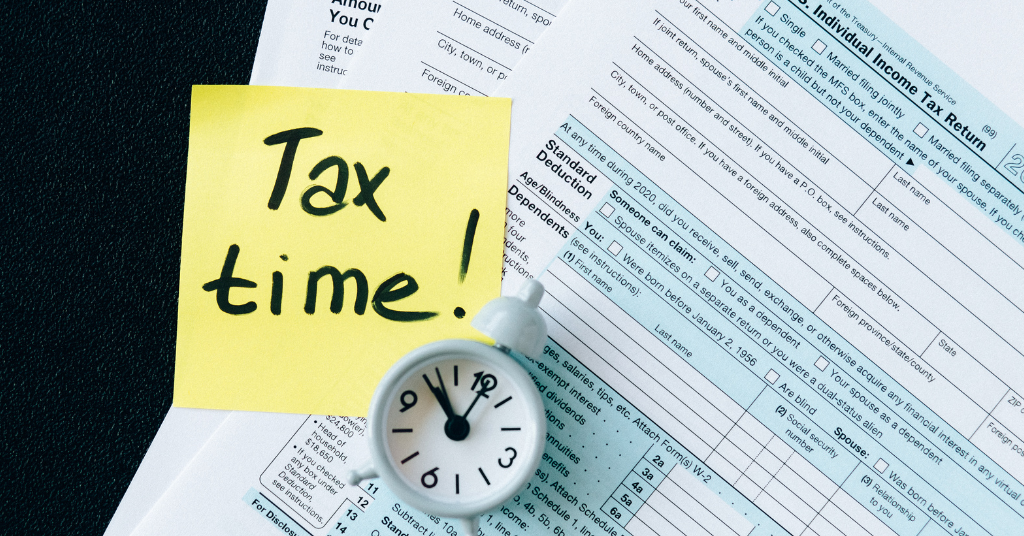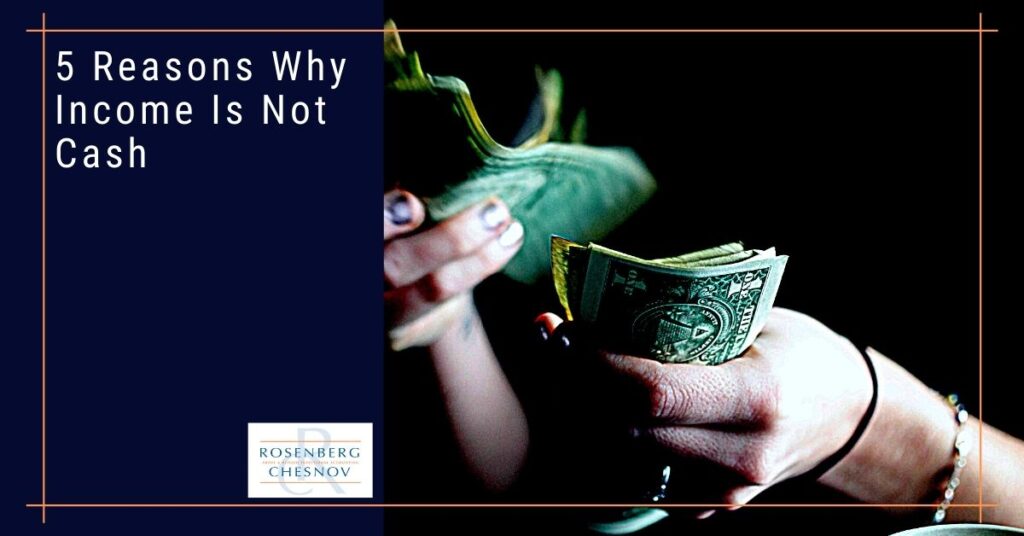

Maximize Your 2024 Refund: Tax Breaks You Might Be Missing
Category: Accounting
Many small businesses use their bank statements to manage their business, assess their business performance, and plan.
This is a dangerous practice because performance rarely moves in line with cash. You can have income with no cash and cash with no income – both of which can be concerns for the future if not well managed.
The core issue is timing. If you bought and sold instantaneously, there wouldn’t be much of a difference between your bank balance and the income you earn. But instantaneous is not possible, so your bank balance is almost always wrong.
Below I start by defining income and then get into four key reasons why income is not equal to cash.


This seems like a simple question, but the answer is complicated. In basic terms, income is revenue minus cost.
In theory, this is easy: if you sell a widget for $10 and it costs you $8 to make and deliver that widget, then your income is $2. Your profit margin is 20%, and your bank balance is $2. This is all nice, clean, and easy to manage.
Life and business are unfortunately not nice, clean, and easy to manage. So here are five reasons why income does not equal cash.
The first significant complexity is timing. Let’s say that you charge your customer before you make or deliver your widget. They pay you upfront.
In this case, you would have $10 in your bank account – but you do not have $10 in income. You will still have to pay that $8 at some point; you just have the money sitting in your account.
So, if you use your bank balance to manage your business, your balance will lull you into thinking you have a lot more income than you do.
Likewise, if you pay the $8, and buy inventory before collecting the money, your bank account will be $8 in the hole. However, your business is not worse off from an income perspective (ignoring the time value of money which I will address below). Over time you will still end up with $2 of income.
Related to timing is accruals; accrual is essentially the formalization of timing. So, again, if you collect $10 for a product that you will deliver in the future, you have that money in the bank, but you don’t get to claim that money as income until you deliver.
In fact, the money isn’t truly yours until you deliver the product or service.
Also, you can accrue an obligation: as you use electricity, you will accrue an obligation to make a payment at the end of the month. Your bank account won’t reflect it, but if you use a kilowatt, the electric company will bill you for it.
Accrual may not be such a big deal if you deliver a $10 product, but imagine that you sell a year’s worth of service upfront. Your customer may deposit the entire amount in your account, but you only get to claim 1/12 of it as income or profit.
You will have received cash but also accrued an obligation to deliver. As you are working, you are also accruing obligations to pay subcontractors (and your electricity bill), none of which reflect in your bank account, but all are real.
While time marches on, your bank account will swing wildly, but none of this has anything to do with how much income you are earning.
Income is what you end up with at the end, not what your bank balance says today.
One issue and opportunity that timing brings up is the time value of money. A dollar today is worth more than a dollar a year from now.
To return to the $10 example: if you put the $10 in the bank at 2% and manage to hold on to the $8 you would spend on the product for a year, you would earn the interest on the $8. This would be approximately 16 cents.
Those 16 cents are income.
When we are talking about $8, this is not a big deal, but if it is $800,000, then it becomes significant money ($16,000).
The same thing happens in reverse: if you borrow money, you will pay interest, and the interest expense reduces your income.
This will show up in your bank balance, but if you don’t realize that it is income or a deduction and track it, you can end up with a big tax surprise at the end of the year.
This can become a huge problem if you are borrowing money and won’t pay it back for a while. In this case, you may have a positive bank balance, but it is all owed to someone else and accruing interest that you will have to pay. It isn’t “your” money to claim as income.
The interest you pay will significantly impact your taxes: so you may end up paying extra taxes if you base your decisions on your bank account balance.
Working capital is money you have invested in inventory (finished goods or work in process). You have paid for the goods or services but haven’t sold them yet.
A growing company will have increasing working capital needs. If there is a lot of demand for your $8 widgets, you may buy a lot of them to keep them in inventory. This means that your cash is leaving the business, but it does not mean that you don’t have income.
It is entirely possible to have significant income and have no cash at all. The problem is: you still have to pay taxes and meet all of your other obligations (like that electricity bill).
This is a massive issue for long lead time items. A beer company, for example, must buy malted barley, yeast, hops, water, and energy. They make the beer then let it sit around for weeks to months to ferment before selling it.
Many indirect expenses will show up in your bank account. But some won’t, and many business owners forget to think about them, so I am adding them here anyway.
Going back to our $10 widget example, it may cost you $6 to produce the widget. The other $2 might be sales, marketing, delivery, or packaging expenses. These are generally indirect expenses.
(I say “generally” because the definition of indirect isn’t perfect, so some may consider these expenses direct expenses, it depends on your product, industry, and how you set up your business).
There is also the cost of your management time.
In economic terms, if you paid $8 and collected $10, but it took you $4 of your time to do so, you lost $2 (the IRS may disagree, but that is another story).
Understanding all your indirect expenses is critical to understanding your income.
If you are a client and would like to book a consultation, call us at +1 (212) 382-3939 or contact us here to set up a time.
If you aren’t a client, why not? We can take care of your accounting, bookkeeping, tax, and CFO needs so that you don’t have to worry about any of them. Interested? Contact us here to set up a no-obligation consultation.
Interested in receiving updates in your mailbox? Check out our newsletter, full of information you can use. It comes out once every two weeks and you can register for it below.


Category: Accounting


Category: Accounting


Category: Accounting
Send us a message and we will contact you as soon as possible.
Jeff Coyle, CPA, Partner of Rosenberg Chesnov, has been with the firm since 2015. He joined the firm after 20 years of business and accounting experience where he learned the value of accurate reporting, using financial information as a basis for good business decisions and the importance of accounting for management.
He is a diligent financial professional, able to manage the details and turn them into relevant business leading information. He has a strong financial background in construction, technology, consulting services and risk management. He also knows what it takes to create organizations having built teams, grown companies and designed processes for financial analysis and reporting.
His business experience includes:
Creating and preparing financial reporting, budgeting and forecasting.
Planning and preparation of GAAP and other basis financial statements.
Providing insight on financial results and providing advice based on those results.
Jeff also has a long history of helping individuals manage their taxes and plan their finances including:
Income tax planning and strategy.
Filing quarterly and annual taxes.
Audit support.
General financial and planning advice.
Prior to joining the firm in 2015, Jeff was in the private sector where he held senior financial and management positions including Controller and Chief Financial Officer. He has experience across industries, including construction, technology and professional services which gives him a deep understanding of business.
Jeff graduated from Montclair State University, he is a CPA and member of the American Institute of Certified Public Accountants, New York State Society of Certified Public Accountants and New Jersey State Society of Public Accountants.
Jody H. Chesnov, CPA, Managing Partner of Rosenberg Chesnov, has been with the firm since 2004. After a career of public accounting and general management, Jody knows the value of good financials. Clarity, decision making, and strategy all start with the facts – Jody has been revealing the facts and turning them into good business results for more than three decades.
He takes a pragmatic approach to accounting, finance and business. His work has supported many companies on their path to growth, including helping them find investors, manage scaling and overcome hurdles. His experience and passion for business reach beyond accounting and he helps businesses focus on what the numbers mean organizationally, operationally and financially.
He has a particular expertise in early-stage growth companies. His strengths lie in cutting through the noise to come up with useful, out of the box, solutions that support clients in building their businesses and realizing their larger visions.
Prior to joining the firm in 2004, Jody was in the private sector where he held senior financial and management positions including General Manager, Chief Financial Officer and Controller. He has experience across industries, which gives him a deep understanding of business.
Jody graduated with a BBA in Accounting from Baruch College, he is a CPA and member of the American Institute of Certified Public Accountants and New York State Society of Certified Public Accountants.
In addition to delivering above and beyond accounting results, Jody is a member of the NYSCPA’s Emerging Tech Entrepreneurial Committee (ETEC), Private Equity and Venture Capital Committee and Family Office Committee.
He is an angel investor through the Westchester Angels, and has served as an advisor for many startup companies and as a mentor through the Founders Institute.